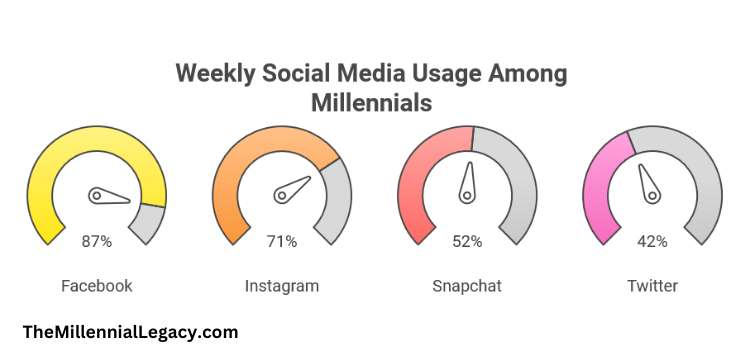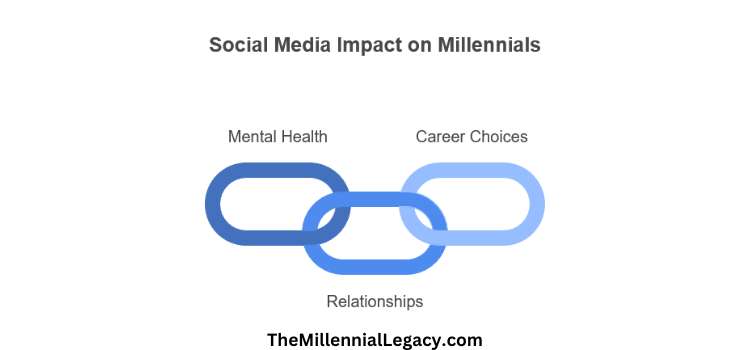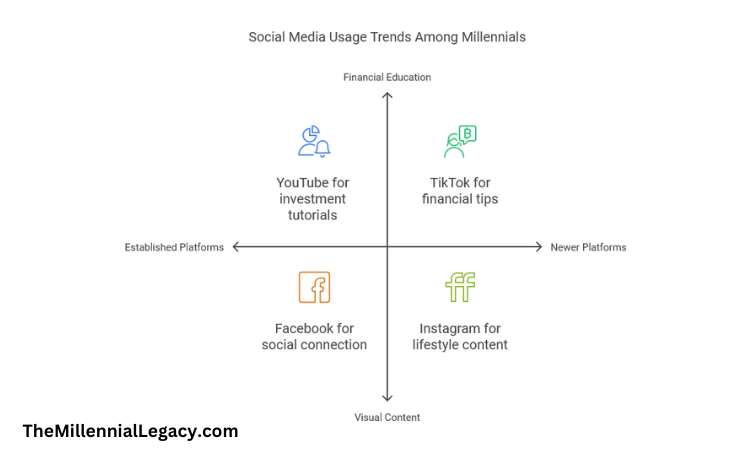
Millennials, the generation born between 1981 and 1996, have grown up alongside the rise of social media. This has created a dynamic interplay where this generation influences the evolution of social media, and in turn, is influenced by it. This article explores the intricate relationship between millennials and social media, examining their usage patterns, the impact of these platforms on their lives, and the evolving trends in their digital engagement.
How Many Millennials Use Social Media?
Millennials are highly active users of social media. Studies show that 89% of American millennials regularly use social networking sites, in contrast to 82% of Gen X and 49% of senior citizens1. They utilize these platforms to interact with brands and retailers, with 82% engaging with brands, 49% following their favorite brands, and 38% using social networks to discover new brands1. This active engagement is further evidenced by the fact that 33% of millennials post or share content on social playforms daily2. Furthermore, research indicates a significant time investment in these platforms, with 20% of millennials spending over 20 hours per week on social media3. This “always-on” generation deeply integrates online communities into their lives, with 72% considering it essential4.
What Social Media do Millennials Use?
Interestingly, while Facebook remains a dominant platform with 87% of millennials using it weekly, Instagram is a close contender with 71% weekly usage2. Snapchat and Twitter also maintain their popularity, with 52% and 42% of millennials using them weekly, respectively5. This multi-platform engagement underscores the diverse ways this generation utilizes social networks for various purposes, from connecting with friends and family to staying informed and following brands and influencers.

Older generations, on the other hand, exhibit lower social media usage. While the gap is narrowing, only 8% of those aged 65 and older use five or more social media platforms, compared to 74% of adults under 306. Older adults primarily use Facebook, with lower usage rates for platforms like Instagram and Twitter7. This difference in platform preference reflects the generational divide in how online communities are perceived and utilized.
Social Media, and Social Change
Millennials are recognized for their strong social consciousness and desire to effect positive change. Social media has become a powerful tool for them to engage in activism and advocate for social causes. They utilize platforms like Twitter, Instagram, and Facebook to raise awareness about social and political issues, organize protests and rallies, and mobilize support for causes they believe in9.
Online Activism
Millennials actively engage in online activism, using social media to express their values and support purpose-driven brands11. They leverage these platforms to demand transparency and accountability from brands and institutions11. However, it’s important to acknowledge the concept of “slacktivism,” where online engagement may not always translate into meaningful offline action12. However, millennials’ activism on the digiral space often translates into offline action. They are more likely to participate in marches, sign petitions, and donate to causes they encounter online2. This demonstrates the potential of social media to amplify social movements and drive real-world change. Furthermore, millennials encounter a diverse range of opinions on social media, with 70% reporting an even mix of similar and different perspectives13. This exposure to diverse viewpoints can broaden their understanding of social issues and contribute to more informed participation in social change initiatives.
How does Social Media Impact Millennials?
The presence of social media in millennials’ lives has significantly impacted various aspects of their well-being, relationships, and career choices.

Mental Health
Studies have shown a correlation between social media use and mental health issues among millennials. Increased social channels usage has been linked to higher levels of anxiety, depression, and other mental health conditions14. The constant exposure to curated online personas and the pressure to present a perfect image of oneself can contribute to negative social comparison, low self-esteem, and feelings of inadequacy15. Moreover, excessive digital networks use can lead to technology addiction and sleep deficits, further exacerbating mental health challenges17. It’s crucial to consider the potential for “sensory overload” from constant online stimulation, which can also negatively impact mental well-being18.
However, it’s important to acknowledge that online social activity can also have positive effects on mental health. It can facilitate a sense of connection, provide access to support groups and mental health resources, and raise awareness about mental health issues14. Some young people find that online spaces positively affect their mental health by allowing them to be creative and build communities around shared interests19. The key lies in finding a balance and using social media in a way that promotes well-being rather than detrimentally affecting it.
The relationship between social media and mental health for millennials is complex and multifaceted. While there are potential risks associated with excessive or unhealthy usage patterns, this online channel can also provide valuable support, connection, and creative outlets14.
Relationships
Beyond mental health, social media also plays a significant role in how millennials navigate their personal relationships. While it can facilitate connections and provide opportunities to meet new people, it can also create challenges in building and sustaining intimate relationships20. The constant presence of online interactions can sometimes overshadow face-to-face communication and lead to misunderstandings and conflicts21.
Furthermore, online social activity can fuel jealousy and insecurity in relationships. Seeing a partner interact with others online can trigger feelings of uncertainty and mistrust22. In fact, 23% of millennials in relationships have reported feeling jealous or unsure because of their partner’s social media interactions22. The pressure to portray a perfect relationship online can also create unrealistic expectations and lead to dissatisfaction in real-life relationships.
The “always-on” nature of social networking can make it challenging for millennials to establish boundaries and maintain healthy communication patterns in their relationships20. The constant stream of online information and interactions can blur the lines between personal and public life, potentially leading to conflicts and misunderstandings.
Career Choices
Social media has become an integral tool for millennials in their career development. Platforms like LinkedIn have revolutionized professional networking, providing opportunities to connect with potential employers, showcase skills and experience, and stay updated on industry trends23.
Moreover, social networking has influenced millennials’ career aspirations. The rise of online influencers and the gig economy has opened up new avenues for career paths24. About half of Gen Z and millennials desire a non-traditional career path, reflecting a shift in values and priorities24. Millennials are increasingly drawn to non-traditional careers 24 that offer flexibility, creativity, and the opportunity to build a personal brand. When making career choices, millennials value information from those who have worked at a company, highlighting the importance of authentic experiences in their decision-making25.
Evolving Trends in Social Media Usage Among Millennials
Millennials’ social media usage patterns are constantly evolving. While they continue to use established platforms like Facebook and Instagram, they are also embracing newer platforms like TikTok and Threads26. This reflects their adaptability and their willingness to explore new ways to connect, consume content, and express themselves online. This is particularly true for younger millennials (18-24), who exhibit a stronger tendency towards visually-oriented platforms like Instagram and Snapchat28.
This generation demonstrates a preference for online bite-sized and personalized content. This aligns with their desire for easily digestible information and curated experiences tailored to their interests.
Another trend is the increasing use of social playforms for financial education and social commerce. Millennials are turning to platforms like YouTube and Instagram for financial advice and are more likely to make purchases based on recommendations from influencers and social media ads29. This highlights the growing influence of online communities on millennials’ financial decisions and consumer behavior.

In contrast, older generations are exhibiting different trends in social usage. While Facebook usage among older adults is increasing, it is declining among younger millennials7. This suggests a shift in platform preferences as younger generations gravitate towards newer, more visually-oriented platforms.
Millennials and social media have a complex and intertwined relationship. Digital networks have become an indispensable part of this generation’s lives, influencing their mental health, relationships, career choices, and social activism. While there are potential downsides to this pervasive digital engagement, millennials are also leveraging it in positive ways to connect, create, and contribute to social change.
This relationship has broader implications for society and culture. This usage patern may influence future generations and shape the development of new technologies. Their engagement with social and political issues online has the potential to reshape political discourse and civic participation. As the online world continues to evolve, it will be crucial to understand how they adapt and influence the future of digital interaction.
Works cited
- https://appliedpsychologydegree.usc.edu/blog/psychology-of-successfully-marketing-to-millennials
- https://moody.utexas.edu/sites/default/files/Millennials-Social-Media-Politics.pdf
- https://review.content-science.com/millennial-content-consumption-fact-sheet/
- https://embryo.com/blog/statistics-on-social-media-use-by-generation/
- https://targetinternet.com/resources/how-different-age-groups-are-using-social-media-2024/
- https://www.pewresearch.org/internet/2024/01/31/americans-social-media-use/
- https://www.waldenu.edu/programs/business/resource/how-age-influences-social-media-preferences
- https://www.marketingcharts.com/digital/social-media-232154
- https://www.adsmurai.com/en/articles/how-millenials-and-generation-z-connect-to-politics
- https://www.pewresearch.org/science/2021/05/26/gen-z-millennials-stand-out-for-climate-change-activism-social-media-engagement-with-issue/
- https://goodgrants.com/resources/articles/the-future-is-fair-how-millennials-are-driving-the-movement-for-social-good/
- https://stars.library.ucf.edu/cgi/viewcontent.cgi?article=2363&context=etd
- https://americanpressinstitute.org/millennials-social-media/
- https://digitalcommons.sacredheart.edu/acadfest/2021/all/86/
- https://via.library.depaul.edu/cgi/viewcontent.cgi?article=1405&context=nursing-colloquium
- https://digitalcommons.sacredheart.edu/cgi/viewcontent.cgi?article=1628&context=acadfest
- https://www.aecf.org/blog/social-medias-concerning-effect-on-teen-mental-health
- https://blogs.lse.ac.uk/parenting4digitalfuture/2022/05/04/social-media-at-different-ages/
- https://sph.emory.edu/news/news-release/2024/05/gen-z-social-media-mental-health.html
- https://www.betterhelp.com/advice/love/how-millennial-love-and-relationships-are-different/
- https://www.harpertherapy.com/blog/2020/01/27/the-impact-of-technology-on-millennial-relationships
- https://www.pewresearch.org/internet/2020/05/08/dating-and-relationships-in-the-digital-age/
- https://cupola.gettysburg.edu/cgi/viewcontent.cgi?article=1740&context=student_scholarship
- https://www.sostandard.com/blogs/social-media-is-changing-gen-zs-career-aspirations/
- https://ideasforleaders.com/Ideas/millennials-3-who-and-what-influences-career-choices/
- https://info.mssmedia.com/blog/how-gen-z-and-millennials-use-social-media-differently
- https://sproutsocial.com/insights/guides/generational-marketing/
- https://targetinternet.com/resources/how-different-age-groups-are-using-social-media
- https://mediatool.com/blog/millennials-trends
- https://www.kansascityfed.org/research/payments-system-research-briefings/social-media-for-personal-finances-a-new-trend-for-millennials-and-gen-z/

